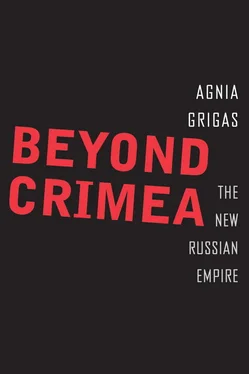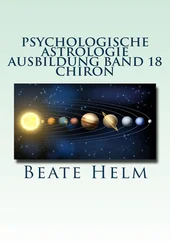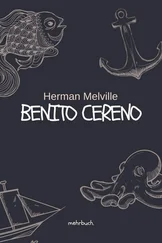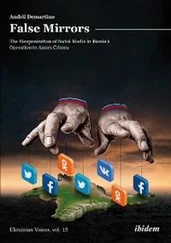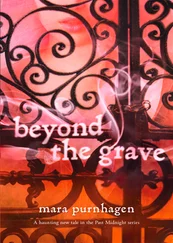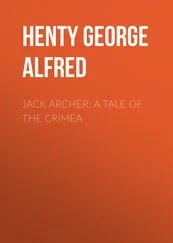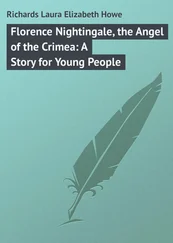21. Alexander Motyl, “The Sources of Russian Conduct: The New Case for Containment,” Foreign Affairs , 16 November 2014, http://www.foreignaffairs.com/articles/142366/alexander-j-motyl/the-sources-of-russian-conduct.
22. Shaun Walker and Harriet Salem, “Russian Parliament Approves Troop Deployment in Ukraine,” The Guardian , 1 March 2014, http://www.theguardian.com/world/2014/mar/02/russia-parliament-approves-military-ukraine-vladimir-putin.
23. On the “winning hearts and minds” concept see Elizabeth Dickinson, “A Bright Shining Slogan,” Foreign Policy , 22 August 2009, http://foreignpolicy.com/2009/08/22/a-bright-shining-slogan/.
24. Motyl, Imperial Ends , p. 5.
25. Michael W. Doyle, Empires (Ithaca, NY: Cornell University Press, 1986), p. 45.
26. Motyl, Imperial Ends, p. 4.
27. Richard Pipes, Russia Under the Old Regime , Great Britain: Penguin, 1995, p. 163.
28. Motyl, Imperial Ends , p. 3.
29. Hélène Carrère d’Encausse, Decline of an Empire: The Soviet Socialist Republics in Revolt (New York: Newsweek Books, 1979), cited in Motyl, Imperial Ends , p. 3.
30. Motyl, Imperial Ends , p. 3.
31. Ibid, p. 99.
32. Daniel Treisman, “Beyond Horror and Mystery,” IWMpost, no. 105 (September–December 2010), http://www.sscnet.ucla.edu/polisci/faculty/treisman/PAPERS_NEW/Beyond%20Horror%20and%20Mystery.pdf.
33. Vera Tolz, Russia (New York: Oxford University Press, 2001), pp. 235–60; Charles Ziegler, “The Russian Diaspora in Central Asia: Russian Compatriots and Moscow’s Foreign Policy,” Demokratizatsiya 14, no. 1 (2006): 103.
34. “Full Text of Putin’s Speech on Crimea,” PraguePost, 19 March 2014, http://praguepost.com/eu-news/37854-full-text-of-putin-s-speech-on-crimea.
35. George Friedman, “The Medvedev Doctrine and American Strategy,” Stratfor, 2 September 2008, http://www.stratfor.com/weekly/medvedev_doctrine_and_american_strategy. See also “Medvedev Outlines the Five Main Points of Future Foreign Policy,” Sputnik International, 31 August 2008, http://sputniknews.com/world/20080831/116422749.html?id=?id.
36. Ivan Egorov and Nikolai Patrushev, “Ukraine Crisis—The View from Russia,” The Guardian , 24 October 2014, http://www.theguardian.com/world/2014/oct/24/sp-ukraine-russia-cold-war.
37. Motyl, Imperial Ends , p. 3.
38. “National Security Concept of the Russian Federation,” Federation of American Scientists, 18 January 2000, https://fas.org/nuke/guide/russia/doctrine/gazeta012400.htm.
39. Levada-Center, http://www.levada.ru/eng/.
40. Robert Coalson, “Russian Nationalists March On, Under Kremlin’s Wary Gaze,” Radio Free Europe/Radio Liberty, http://www.rferl.org/content/russia-nationalist-march/26672137.html.
41. “Russian Public Opinion 2012–2013,” The Analytical Centre of Yury Levada, Moscow, 2013, p. 107, http://www.levada.ru/sites/default/files/2012_eng.pdf.
42. Marek Menkiszak, “The Putin Doctrine: The Formation of a Conceptual Framework for Russian Dominance in the Post-Soviet Area,” OSW Commentary , no. 131 (28 March 2014): 4.
43. Doyle, Empires , p. 45.
44. Menkiszak, “The Putin Doctrine,” p. 4.
45. “Indeksy,” Levada-Tsentr, http://www.levada.ru/indeksy.
46. Tomas Jivanda, “Vladimir Putin’s Approval Rating Hits Three Year High as Russians Back President over Ukraine,” The Independent , 14 March 2014, http://www.independent.co.uk/news/world/europe/vladimir-putins-approval-rating-hits-three-year-high-as-russians-back-putin-over-ukraine-9192170.html.
47. Brian C. Black, Crude Reality—Petroleum in World History (Lanham, MD: Rowman & Littlefield, 2012), p. 145.
48. Agnia Grigas, The Politics of Energy and Memory Between the Baltic States and Russia (Farnham, UK: Ashgate, 2013); Margarita M. Balmaceda, Politics of Energy Dependency: Ukraine, Belarus, and Lithuania Between Domestic Oligarchs and Russian Pressure (Toronto: Toronto University Press, 2013).
49. Anne Applebaum, “Russia’s Corrupt Chokehold on Europe,” Slate, 25 July 2014, http://www.slate.com/articles/news_and_politics/foreigners/2014/07/russia_s_corrupt_control_of_europe_how_vladimir_putin_keeps_the_continent.html; Joshua Keating, “From Russia With Cash,” ibid., 26 November 2014, http://www.slate.com/blogs/the_world_/2014/11/26/from_russia_with_cash.html.
50. Ambrose Evans-Pritchard and Peter Spence, “Russian Crisis Turns Systemic as Rouble Crashes 13pc,” The Telegraph , 15 December 2014, http://www.telegraph.co.uk/finance/economics/11295402/Russian-crisis-turns-systemic-as-rouble-crashes-13pc.html; Peter Spence, “Russian Economic Crisis: As It Happened 16 December 2014,” ibid., 16 December 2014, http://www.telegraph.co.uk/finance/economics/11296233/Russian-economic-crisis-live.html.
51. Olga Tanas, “Russia Sees $140 Billion Annual Loss From Oil, Sanctions,” BloombergBusiness, 24 November 2014, http://www.bloomberg.com/news/2014-11-24/russia-sees-140-billion-annual-loss-from-oil-sanctions.html.
52. “Medvedev: We’re ‘Not Afraid’ of a New Cold War,” Nbcnews.com, 26 August 2008, http://www.nbcnews.com/id/26403580/ns/world_news-europe/t/medvedev-were-not-afraid-new-cold-war/#.VGEZlYfq9Ro.
53. Oliver Bullough, “Former Aide Says Putin Has No Strategic Plans,” Time , 5 November 2014, http://time.com/3547935/putin-pugachev-oligarchs/.
54. Thomas Frear, Łukasz Kulesa, and Ian Kearns, “Dangerous Brinkmanship: Close Military Encounters between Russia and the West in 2014,” European Leadership Network, Policy Brief, November 2014, http://www.europeanleadershipnetwork.org/medialibrary/2014/11/09/6375e3da/Dangerous%20Brinkmanship.pdf.
55. Ibid.
CHAPTER 2. RUSSIAN REIMPERIALIZATION
Epigraph: Michał Kacewicz, “A Final Interview With Boris Nemtsov,” News-week , 28 February 2015, http://www.newsweek.com/final-interview-boris-nemtsov-310392.
1. In 1989 the crude oil price was $23.73 per barrel and by 1997 it fell to $12.72.
2. “Putin on ‘Self-Determination of the Russian People,’” Den’.kiev.ua, 26 January 2014, http://www.day.kiev.ua/en/article/day-after-day/putin-self-determination-russian-people.
3. Nadia Diuk, “Euromaidan: Ukraine’s Self-Organizing Revolution,” World Affairs , March/April 2014, http://www.worldaffairsjournal.org/article/euromaidan-ukraine%E2%80%99s-self-organizing-revolution.
4. Joseph S. Nye Jr., Soft Power: The Means to Success in World Politics (New York: Public Affairs, 2004), pp. 6, 8, 11–15.
5. James Sherr, Hard Diplomacy and Soft Coercion: Russia’s Influence Abroad (London: Chatham House, 2013), p. 2.
6. James Sherr, “Russian Soft Power in the ‘New’ and ‘Old’ Europe,” Conference on Russian Soft Power, Arlington, VA, 13 January 2011.
7. Agnia Grigas, “Legacies, Coercion and Soft Power: Russian Influence in the Baltic States,” Chatham House Briefing Paper, August 2012, http://www.chathamhouse.org/sites/files/chathamhouse/public/Research/Russia%20and%20Eurasia/0812bp_grigas.pdf.
8. Vladimir Rukavishnikov, “Russia’s ‘Soft Power’ in the Putin Epoch,” in Russian Foreign Policy in the 21st Century , ed. Roget Kanet (Houndmills, UK: Palgrave Macmillan, 2010), pp. 76–97.
9. Russia, Ministry of Foreign Affairs, “A Survey of Russian Federation Foreign policy,” http://www.mid.ru/brp_4.nsf/e78a48070f128a7b43256999005bcbb3/89a30b3a6b65b4f2c32572d700292f74.
10. “The National Question,” cited in James Sherr, Hard Diplomacy and Soft Coercion , p. 73.
11. Gatis Pelnēns, ed., The “Humanitarian Dimension” of Russian Foreign Policy Toward Georgia, Moldova, Ukraine, and the Baltic States (Riga: Centre for East European Policy Studies, 2009), p. 39.
Читать дальше
